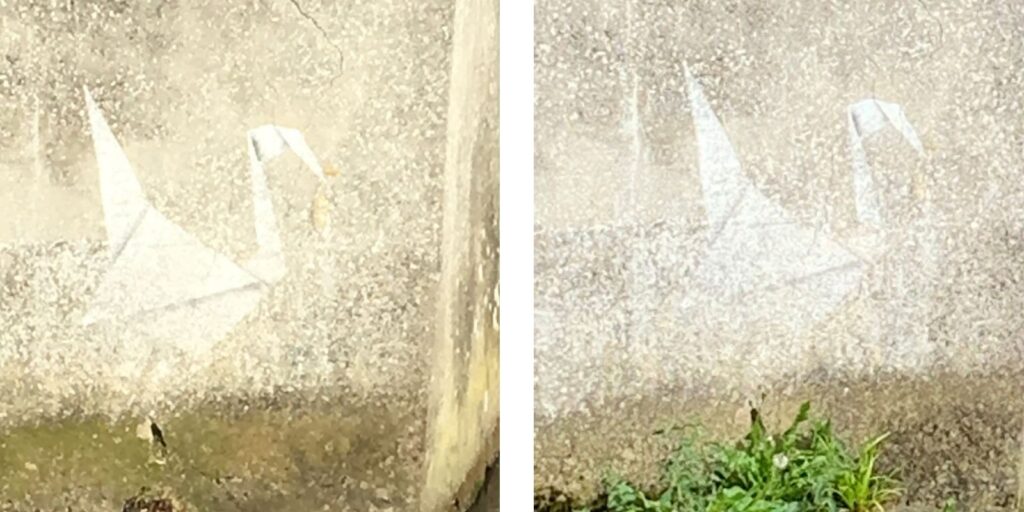
Did you know they reckon a Banksy mural appearing on your building can nearly double the value of your property? And I’m sure there are towns on the east coast that have been enjoying a Banksy Bounce after his summer spraycation left us a number of new pieces.
You’d presumably be pretty thrilled. You’d look after it, You’d make some decisions about what to do with it.
Or not, if you’re Palmers Brewery and own a garage in Lyme Regis
Fading into the background

Lyme Regis has had its own Banksy since 2012. But among the many tourists who’ve been to Lyme, I imagine most have missed the Banksy stork. There are no signs, very rarely any other people taking pictures of it.
That’s probably mainly because it’s faded so much it’s quite hard to spot. Even over the four years between my photos, it’s quite a marked change, and it was five years old when I first shot it.
The ephemeral nature of art or the squandering of an opportunity?
What does this have to do with your business?
You may be wondering why the hell I’m telling you about a bit of graffiti. You read this hoping to find something useful to help you with content and copy for your business.
You are not on a mission to save a Banksy.
Me neither.
Where I am on a mission is to help businesses not to squander their stories by letting them fade into the mists of time. Stories are too valuable an asset to every business for them to just disappear because no one took care of them, took time to recall them.
Unlike with this Banksy, it’s not a deliberate choice, you’re busy and there’s always something else to do when you’ve got a business to run.
But I’ve got a question for you.
What did you do during the first lockdown?
The reason for the last two posts with stories from a variety of small business owners is to show that every kind of business has some key things behind it:
- A human being facing all kinds of things every day, and choosing how to react to those.
- Experiences and stories that are different and distinctive to the next business, no matter how similar your businesses might be.
There are some similarities between the six stories, but none are identical. They can only be told by that individual, that business. They show their humanity, vulnerability, humour, approach to life and ability to change. None of them are particularly big, earth-shattering stories, but that doesn’t mean they don’t have value, that they’re not an asset.
Most of the six people said they hadn’t really taken the time to reflect on these things before. There’s no shame in that, they are probably not alone in that admission.
But taking that time to remember and recall is creating an asset that only you can own. And you just never know when you might need it.
Our memories are always imperfect
When I wrote about the “legend” of the No 7 serum, I wrote about how even the people most closely associated with it had very different memories of the events. And that was a fairly big event.
For many of us though, the things that connect us to a brand are the smallest stories. Something that could so easily be missed, or forgotten. They show us something about that business that we didn’t know or reinforce how we feel about that business, why we choose to support them.
The gift of loo roll

Do you ever read the P.S. on an email?
I think the most memorable one I’ve read, the one that made me laugh, and that I can still recall, was from Hiut Denim. It was about having to close the factory at the start of the pandemic and announcing a sale.
So far, so normal.
But the P.S. said something along the lines of for Christmas they gave everyone on the team a bottle of champagne. When they told them they had to go home they also told them they could help themselves to the stocks of toilet roll.
Remember when toilet roll was more valuable than champagne?
It’s a detail. It could have been lost. I guarantee it’ll live on (mainly because David and his team are really good at this stuff).
Banking your story assets the simple way
None of us have time to record everything in detail, every day. But it doesn’t have to be like that in order to build up a bank of story assets.
Comedians and writers gather material all the time, observing the world as they go. They scribble away in countless notebooks, not knowing when they’ll need something or how they’ll use it, but they just might. Or it might set off another thought.
I love a good notebook, and I scribble a lot. It might not be your thing.
Doesn’t have to be. You could record a quick voice memo to yourself, write a note on your phone, take a video. It doesn’t matter how you do it, only that you do.
What to add to your notes
Make this easy on yourself. You don’t need to write War & Peace. I’d think about four things:
- What’s the moment you want to remember?
- What do you think the moment could tell people about what you do or what you stand for?
- When do you think you’d tell it?
- Who would you tell it to?
Just give yourself enough detail to make sense when you read it again, whether that’s the next day or six months later.
Creating the bank creates better recall

Your bank is an asset and a place to stimulate your creativity. And it is uniquely yours. That’s its value.
Those notes also help you to remember more detail in the future. If you’ve saved enough detail at the time, it’ll be easier to recall more of the story when you need it.
Small decisions can build legends
Many of us will know the story of the founders of Innocent having voting buckets at their first event. It was a small decision, a small story, and one that’s gone on to be told many, many times as part of the story behind their success.
And it would have been so easy to forget in the midst of building a business. But it wasn’t.
Giving people loo roll probably won’t be part of the Hiut legends, but it might be. It’ll be in the legend of how they survived 2020. We often only see our stories looking backwards.
Just don’t let them fade into obscurity. Don’t squander the assets you could be building.
Or, in Palmers’ case, the ones you’ve been gifted.